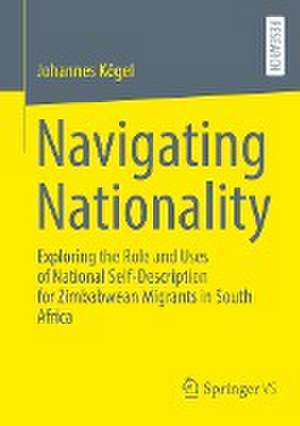Navigating Nationality: Exploring the Role and Uses of National Self-Description for Zimbabwean Migrants in South Africa
Autor Johannes Kögelen Limba Engleză Paperback – 19 ian 2024
Preț: 590.63 lei
Preț vechi: 694.86 lei
-15% Nou
Puncte Express: 886
Preț estimativ în valută:
113.01€ • 118.33$ • 93.74£
113.01€ • 118.33$ • 93.74£
Carte tipărită la comandă
Livrare economică 09-23 aprilie
Preluare comenzi: 021 569.72.76
Specificații
ISBN-13: 9783658438494
ISBN-10: 3658438495
Pagini: 444
Ilustrații: XVIII, 444 p. 2 illus. Textbook for German language market.
Dimensiuni: 148 x 210 mm
Greutate: 0.6 kg
Ediția:1st ed. 2024
Editura: Springer Fachmedien Wiesbaden
Colecția Springer VS
Locul publicării:Wiesbaden, Germany
ISBN-10: 3658438495
Pagini: 444
Ilustrații: XVIII, 444 p. 2 illus. Textbook for German language market.
Dimensiuni: 148 x 210 mm
Greutate: 0.6 kg
Ediția:1st ed. 2024
Editura: Springer Fachmedien Wiesbaden
Colecția Springer VS
Locul publicării:Wiesbaden, Germany
Cuprins
Introduction: On unfamiliar territory.- Crossing borders in Southern Africa.- Doing research in postcolonial times.- Theoretical framework: Revising concepts of migration studies.- Finding ways to and in Cape Town: Challenges and mitigating factors.- Collective self-description: Actual, vague, and absent figures of identification.- The others: Comparisons to (other) collectives.- “It’s not easy if you are Zimbabwean”: Being Zimbabwean in South Africa.- Examining insider-outsider dynamics.- Nationality, citizenship, and belonging.- Conclusion: Paradoxes of nationality in theory and practice.
Notă biografică
Johannes Kögel studied philosophy and sociology in Munich and Cape Town. He currently works as a research associate at the University of Munich (LMU München). He has conducted social research on diverse topics such as brain-computer interfaces, xenotransplantation, and migration in South Africa.
Textul de pe ultima copertă
In recounting their migration journey, references to nationality pervade the narratives of Zimbabweans in South Africa. Given the challenges many migrants confront based on their nationality, this presents a seeming paradox. This qualitative interview study, conducted with Zimbabwean migrants in two areas of Cape Town—Observatory and Dunoon—aims to elucidate the nuances of national self-descriptions in a demanding environment. Identifying as Zimbabwean serves as a sanctuary and a retreat, where alternative identifications often prove transient; embracing Zimbabweanness fosters an affirmative and positive self-perception, surpassing the limitations of other collective self-descriptions. Rather than pre-emptively characterizing a nationalist demeanour, the articulation of national self-description emerges as a strategic tool to navigate experiences of hostility and discrimination, while also asserting legitimate claims to equal opportunities. In this way, nationality takes a trajectory that diverges from conventional notions of nationality (and the ones of the nation-state or citizenship) as per Northern theory, contributing to alternative conceptualizations within the framework of the Global South.
About the author
Johannes Kögel studied philosophy and sociology in Munich and Cape Town. He currently works as a research associate at the University of Munich (LMU München). He has conducted social research on diverse topics such as brain-computer interfaces, xenotransplantation, and migration in South Africa.
